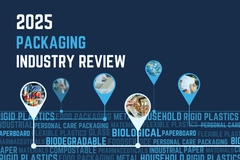Erema presents PET fiber-to-fiber recycling solution to drive textile circularity

13 Jun 2023 --- European technology provider Erema has unveiled its Intarema FibrePro:IV machine for PET fiber-to-fiber recycling. Aimed at the textile industry, the machine’s material preparation and spinning oil-removing capabilities allow the reuse of recycled PET (rPET) to produce fine fibers.
Waste PET from production processes can be further processed into rPET filament fiber, carpet yarn and staple fiber.
“The fibers and textiles application is not completely new to us because our PET recycling machines have already been used in fiber recycling. However, a new technological solution was needed to reuse these recycled fibers in higher-quality applications,” explains Wolfgang Hermann, business development manager at Erema Group.
The company highlights the importance of high-quality recycling solutions for the circular economy. Reportedly, PET is a key material in producing synthetic fibers, with around two-thirds of the total volume utilized as PET fibers for the textile industry.
.png) Erema's Intarema FibrePro:IV machine for PET fiber-to-fiber recycling.Technology bettering quality
Erema's Intarema FibrePro:IV machine for PET fiber-to-fiber recycling.Technology bettering quality
The Intarema system is characterized by a longer residence time of the PET melt, which the recycling machine manufacturer says is an essential factor for achieving high-quality recycled pellets. It allows spinning oils and other additives used to improve the handling of the fibers during manufacturing to be removed more efficiently than in conventional PET recycling processes.
The Intarema prepares the material for extrusion using its Preconditioning Unit and Counter Current technology to ensure homogenization, pre-drying, removal of volatile components and subsequent gentle PET melting.
Meanwhile, the new intrinsic viscosity (IV) Uptimiser provides repolymerization, IV lift and efficiently cleans the fibers of finishing additives.
“Including filtration, the output quality that we achieve with this recycling process is so high that ultra-fine fibers of up to two decitex can be produced using these rPET pellets, with an rPET content of 100%,” asserts Markus Huber-Lindinger, managing director at Erema.
The Group also opened a fiber test center in Austria to accelerate the recycling of mixed fiber materials from classic textile recycling collections. A cross-company team is working on recycling solutions for fiber-to-fiber applications on site.
The center also operates a fully equipped and variable industrial-scale recycling plant. It includes the peripheral technology required and is available to customers for trials.
Textile industry
In other news, a recent fast fashion bioplastic study raised greenwashing fears but left the industry irritated. The study found that synthetic textiles, including “compostable” plastics like polylactic acid (PLA), do not degrade after more than a year in the ocean.
But the bioplastics industry dismissed the findings as irrelevant, pointing out that the fashion industry does not use PLA because it is “compostable” but because it is bio-based and avoids fossil-based resources.
Cupshe, a global fashion and beachwear e-tailer, launched The Recycled Swim Collection, made with a minimum of 20% recycled materials. The release attempts to help circularize fashion industry production, which usually relies on beverage bottles for recycled content.
Fashion Index updated its Eco-Friendly Packaging Sourcing Platform allowing fashion companies to find complimentary packaging retailers to support their ecological goals.
“Fashion Index was created to unite new and scale small to midsize [packaging] companies and fashion companies to find new solutions best suited to their needs,” Tirsa Parrish, co-founder and managing partner of Fashion Index, previously told PackagingInsights.
We also spoke to Stella Lee, artist and material designer, who has taken to social media to showcase her shoe designs which employ leftover packaging from fashion merchandise instead of using typical leather and rubber materials.
Edited by Radhika Sikaria











